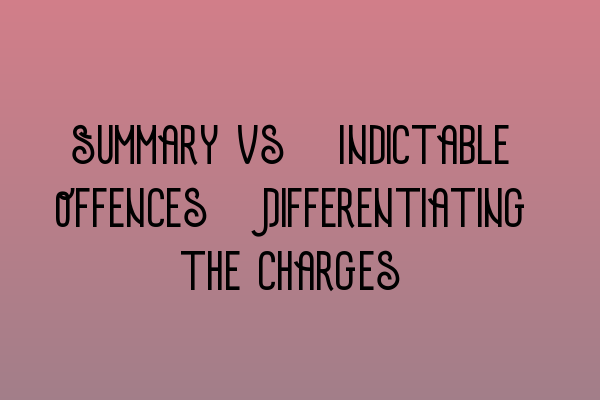Summary vs. Indictable Offences: Differentiating the Charges
As a solicitor practicing criminal law in the UK, it is crucial to have a deep understanding of the different types of offences and charges that exist in our legal system. One of the most fundamental distinctions is between summary and indictable offences. In this article, we will explore the key differences between these charges and their implications for the prosecution and defense.
Summary Offences
Summary offences are considered less serious crimes and are typically heard in the Magistrates’ Court. These offenses are usually punishable by a maximum of six months’ imprisonment, a fine, or both. Common examples of summary offences include minor traffic violations, public order offenses, and low-level assaults.
In the UK, the burden of proof for summary offences is generally lower than for indictable offenses. The prosecution must prove beyond a reasonable doubt that the accused committed the offense. However, the formalities and complexities of the trial process are less rigorous compared to those of indictable offenses.
The trial for a summary offense is often heard before a single magistrate or a panel of three magistrates, known as justices of the peace. In some cases, a district judge may preside over the trial. The accused does not have the right to a jury trial for summary offences. However, they have the option to elect for a trial by jury if the case is sent to the Crown Court.
It is important to note that not all offenses can be classified as summary offenses. Some crimes, such as murder, rape, and robbery, are always treated as indictable offenses due to their serious nature.
Indictable Offences
Indictable offenses are more serious crimes and are usually heard in the Crown Court. These charges are punishable by longer prison sentences, and the complexity of the trial process is higher. Examples of indictable offenses include murder, drug trafficking, sexual offenses, and fraud.
The burden of proof for indictable offenses is the same as for summary offenses, which is beyond a reasonable doubt. However, the trial process for indictable offenses is far more formal and structured. This includes jury selection, examination of witnesses, cross-examinations, and legal arguments presented by both the prosecution and defense.
Unlike summary offenses, the accused has the right to a jury trial for indictable offenses. The jury consists of twelve members selected from the general public, and their role is to determine whether the accused is guilty or not guilty based on the evidence presented during the trial. The judge presides over the trial and provides guidance on legal matters.
In some cases, indictable offenses can be tried summarily in the Magistrates’ Court if the defendant agrees to it and the Magistrates’ Court feels the offense is suitable for summary trial. This may happen when the offense is less serious or if the defendant consents to the summary trial.
Conclusion
Understanding the differences between summary and indictable offenses is crucial for solicitors practicing criminal law. By understanding the nature of the charges, the burden of proof, and the trial process, solicitors can provide their clients with the best possible legal representation.
If you are aspiring to become a solicitor and are preparing for the SQE exam, make sure to check out our related article on “SQE Exam Prep: Essential Study Materials for Aspiring Solicitors,” which provides valuable study resources and guidance.
For a deeper understanding of the Solicitors Qualifying Examination format, read our informative article on “Demystifying the Solicitors Qualifying Examination Format,” where we break down the exam structure and offer tips for success.
If you are an international lawyer preparing for the SQE exam, you may find our article on “SQE Exam for International Lawyers: Challenges and Success Strategies” particularly helpful, as it addresses the unique challenges you may face and provides strategies for success.
Finally, if you are considering LLC formation as a UK entrepreneur, we have two comprehensive step-by-step guides for you: “LLC Formation Made Simple: Step-by-Step Guide for UK Entrepreneurs” and “LLC Formation: A Step-by-Step Guide for UK Entrepreneurs.” These articles will walk you through the process and provide valuable insights.
Keep exploring our website for more informative articles and resources to enhance your knowledge in various legal areas.
